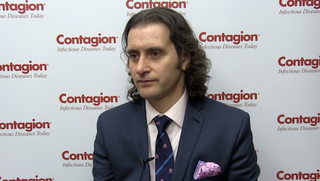
C. Difficile
Latest News
Latest Videos

CME Content
More News

While antibiotic resistance continues to lead to deadly Clostridium difficile infections, a team of researchers has found that a probiotic may offer a new way to kill the superbug.

Penn researchers find that cases of recurrent C. difficile infections are rapidly increasing, underscoring the need for new treatment options, such as fecal microbiota transplants.

Kirk Hevener, PharmD, PhD, explains why narrow-spectrum antibiotics are more beneficial for treating C. difficile.

Gonzalo Bearman, MD, MPH, explains what is known about Clostridium difficile prevention and control.

Gonzalo Bearman, MD, MPH, shares a few things to keep in mind when using bundled approaches against C. difficile.

Superbugs, Zika, antibiotic development, C. difficile, and HIV are the article topics making up this week’s Top 5 articles.

Kirk Hevener, PharmD, PhD, explains the drawbacks of first-line drugs that are currently used to treat C. difficile infections.

Julian Hurdle, PhD explains why some patients experience recurrence of Clostridium difficile after treatment.

Niaz Banaei, MD, discusses some reasons why healthcare-associated C. difficile tends to be over-diagnosed.

Researchers believe that an increased incidence of C. difficile in travelers returning from international destinations may be linked to travelers' diarrhea.

In a Phase 2 controlled clinical study, patients with Clostridium difficile infection receiving ridinilazole were found to have achieved better treatment outcomes than those receiving vancomycin.

What can healthcare providers do to stop these infections before they start?

Research coming in from the University of Texas Health Science Center at Houston shows that when it comes to treating those with C. difficile, frozen and freeze-dried products for Fecal Microbiota Transplantation are nearly as effective as fresh product.

News on Heliobacter pylori, Zika, Clostridium difficile, Powassan virus, and influenza make up the top 5 news articles from Contagion® in March 2017.

On March 30, 2017, at the SHEA Spring 2017 Conference, Thomas Sandora, MD, MPH, shared some tips regarding ways to manage movement outside of the room for patients who are on contact precautions.

Contagion® will be covering the conference, and so keep a look out for session coverage, as well as interviews with some of the key presenters.

In case you missed them, our top 5 articles for the week of March 19, 2017 are highlighted here.

Duke Health researchers have found that a UVC machine use can reduce transmission of harmful superbugs in hospital settings.

As emerging infectious diseases and resistant bugs become a growing issue, the need for stronger disinfectants becomes even more vital.

On March 5, 2017, at the 2017 Annual Meeting of the American Academy of Allergy, Asthma & Immunology (AAAAI), Gary Huang, MD, PhD, explained his research team's findings regarding self-reported allergy to drugs containing β-lactams.

Robin Jump, MD, PhD, assistant professor in the Department of Medicine at the Case Western Reserve University sat down with Contagion™ to discuss up-and-coming prevention methods for C. diff in the hospital setting.

In a new study, researchers found that patients with severe Clostridium difficile (C. diff) infections who were treated with vancomycin had lower mortality rates than patients who were treated with metronidazole.

A new study from the United Kingdom highlights the importance of antibiotic restriction in the reduction of hospital-acquired C. difficile infections.

Researchers found the experimental vaccine could potentially inhibit severe diarrhea and pseudomembranous colitis by inducing a functional antibody response that can neutralize the two main disease-causing toxins (toxin A or B) produced by C. difficile.

A new study has provided more evidence to show that certain heartburn medications may make individuals more susceptible to gastrointestinal infections.










































































































































